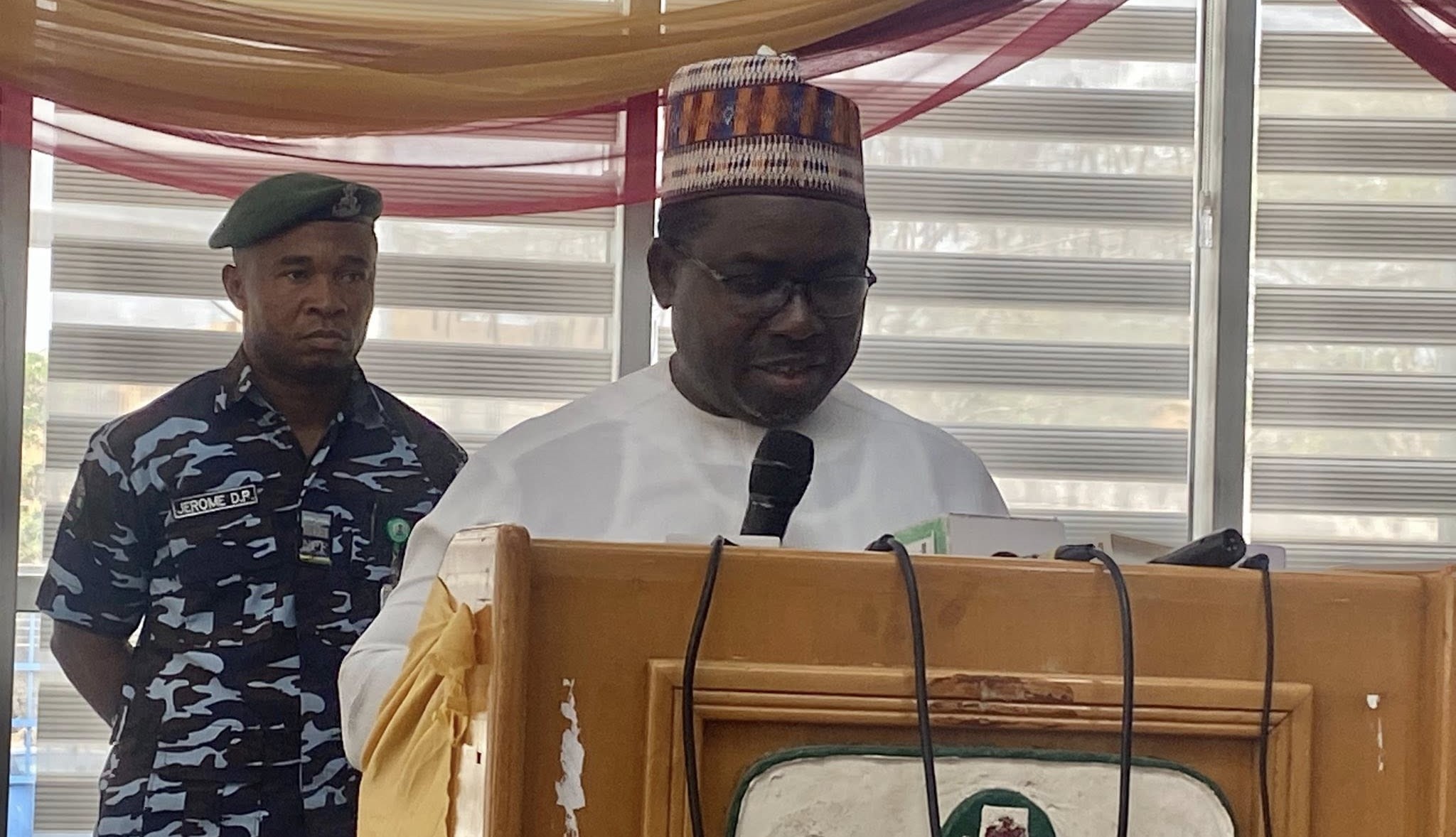HEADLINES
Mon, Dec 08, 2025


Nigeria's Dysfunctional Economy under a Bleeding Civil Service
By abidemi ADEBAMIWA
 Nigeria's Economic Minders at a recent CBN's Monetary Policy Forum Themed: Managing the Disinflation Process
Nigeria's Economic Minders at a recent CBN's Monetary Policy Forum Themed: Managing the Disinflation Process
Nigeria’s Economy continues to struggle under the weight of Inflation, Stagnation, and high Unemployment, with Inefficiency in the Civil Service playing a Major Role in these Challenges. Despite a large pool of Skilled but Unemployed Individuals, many Civil Servants fail to deliver meaningful results, exacerbating Economic Hardship and slowing National Progress. This Imbalance—where Inefficiency persists while Talent remains untapped—creates a vicious cycle that deepens Nigeria’s Economic Woes.
Productivity and Innovation suffer when the Civil Service fails to function effectively. Reports indicate that enormous Resources are allocated to sustaining a Workforce that often lacks tangible contributions to National Development. The National Bureau of Statistics (NBS) revealed that Nigeria’s Inflation Rate surged to 34.80% in December 2024, up from 28.92% the previous year. Low Productivity within the Public Sector, compounded by Ghost Workers, Redundant Roles, and Systemic Inefficiencies, fuels this Inflationary Pressure.
The Misallocation of Resources is one of the most damaging consequences of this Inefficiency. Funds that could modernise Infrastructure, improve Public Services, and Digitise Government Operations are instead spent on Salaries for Roles that add little to no Value. Worse still, Money is lost to Ghost Employees, draining Public Finances while Essential Sectors remain underfunded. The ripple effect is severe—Innovation stagnates, Service Delivery deteriorates, and Economic Growth remains sluggish.
An Underperforming Civil Service fuels Inflation as the Government increases Public Spending to compensate for Inefficiencies. Larger Deficits and excessive Borrowing become necessary to sustain an Unproductive Bureaucracy, driving up Inflation. When a significant portion of the National Budget is consumed by an Ineffective Workforce, Deficit Financing becomes the fallback Strategy, worsening Economic Instability. This cycle stifles Investment, weakens Purchasing Power, and deepens Financial Uncertainty for Businesses and Households alike.
Beyond its Financial Implications, a Culture of Inefficiency damages morale within the Civil Service. Employees who perform well often find themselves disheartened by an Environment that tolerates mediocrity. Weak Accountability Structures allow underperformance to persist, eroding Public Trust in Government Institutions. Without strong Incentives for Excellence, even Competent Civil Servants may lose Motivation, further compounding Inefficiency across various Government Agencies.
While the Official Unemployment Rate in Nigeria dropped to 4.3% in Q2 2024, the reality is far more complex. The Methodology used in the Nigeria Labour Force Survey (NLFS) classifies Individuals as employed even if they work as little as one hour per week. This broad Definition masks the true scale of Economic Inactivity, with many Nigerians stuck in precarious Informal Jobs that offer little Security or Financial Stability. The combined Unemployment and Underemployment Rate (LU2) remains at 13%, reflecting a deeper Structural Issue within the Labour Market.
Unlike Countries such as the United States and the United Kingdom, where Labour Force Surveys capture Discouraged Workers and Underemployed Individuals seeking Full-Time Jobs, Nigeria’s approach fails to account for these Realities. The U.S. Bureau of Labor Statistics conducts Monthly Surveys distinguishing between Full-Time Employment, Part-Time Work, and discouraged Job Seekers, providing a more accurate Assessment of Labor Market Conditions. Similarly, the UK’s Labour Force Survey includes those actively seeking Jobs and those Underemployed, offering a clearer picture of Employment Trends. In contrast, Nigeria’s Labour Statistics often understate the true extent of Joblessness, leading to Policies that do not fully address Workforce Challenges.
This flawed Measurement System obscures a Fundamental Issue: while Skilled Individuals remain unemployed, many Civil Service Positions are occupied by Individuals who contribute little to Economic Progress. Addressing this Imbalance requires a bold Restructuring of the Civil Service—one that prioritises Performance and Efficiency. Retiring Underperforming Employees and replacing them with Capable Professionals would create a more Dynamic Public Sector, reduce Waste, and redirect Resources toward Critical Development Areas such as Infrastructure, Education, and Healthcare.
However, such a Transformation must be executed carefully to prevent unintended consequences such as Political Interference or Sudden Job Losses. Performance-Based Assessments, using Key Performance Indicators, should identify Underperforming Civil Servants who consistently fail to meet Expectations. Those found lacking should undergo Retraining or be gradually phased out. A Structured Transition Plan would ensure that Workforce Reductions do not lead to Economic Displacement, with Retraining Programs guiding Affected Workers into Alternative Sectors like Agriculture, Technology, or Entrepreneurship.
Partnering with the Private Sector would further strengthen this Strategy, absorbing Skilled but Unemployed Individuals into Industries where their Expertise is needed. A Phased Approach would minimise disruption while gradually reshaping the Civil Service into a Leaner, more Effective Institution. Reducing the Public Sector Wage Bill would allow the Government to reallocate Funds toward Infrastructure Development, Business-Friendly Policies, and Social Services that drive Economic Growth.
A revitalised Civil Service would improve Roads, Electricity, and Digital Infrastructure, creating an Environment where Businesses thrive, and Job Opportunities expand. Investments in Technical and Vocational Education would equip Young Nigerians with Job-Relevant Skills, bridging the gap between Education and Employment. Strengthening the Healthcare System would enhance Workforce Productivity, reducing absenteeism and increasing overall Economic Efficiency. These Interconnected Reforms would not only stabilise the Economy but also lay the Foundation for Long-Term Prosperity.
Sustaining these changes requires a shift in Mindset—one that values Merit, Accountability, and Innovation over outdated Bureaucratic Norms. Advancements within the Civil Service should be based on Performance rather than Tenure or Political Connections. Introducing Competitive Salaries for Top Performers would incentivise Excellence and reduce Corruption. Leveraging Technology to Automate Government Processes would enhance Transparency, eliminate Ghost Workers, and improve Service Delivery. A clear and fair Performance Review System would ensure that Employees remain motivated, contributing meaningfully to National Development.
Nigeria stands at a crossroads, with an Opportunity to unlock its vast Workforce Potential through decisive Reforms. By adopting a more accurate Unemployment Measurement System, Restructuring the Civil Service, and integrating Skilled Workers into Public Administration, the Government can foster a Culture of Efficiency, Accountability, and Innovation. Prioritising Productivity over Bureaucracy will set the Stage for a Stable, Prosperous Economy—one where Inflation is curbed, Employment thrives, and National Development is no longer hindered by Inefficiency. Bold action today can secure a brighter Future for all Nigerians.
News in Pictures
Copyright 2025, Thenewsroom.ng











Comments
Be the first to comment on this post
Leave a Reply